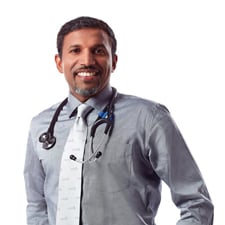If you are looking to enter the U.S. physician workforce as an international medical graduate (IMG), following residency or fellowship, you are likely examining pros and cons of each potential practice setting.
One option that may offer some appeal is working in academic medicine.
Academic institutions offer opportunities for research and being at the cutting edge of knowledge and skills, including taking on the patients who are toughest to diagnose and treat. You also can work to shape the future of medicine by teaching the next generation of students and residents.
Based on insight from an IMG who has excelled in the field, there is a path for IMGs to land faculty positions and succeed in academic medicine. These four tips can help IMG residents make a smooth transition to the academic setting.
Learn more with the AMA about what to consider before you choose a practice setting.
Say yes
Having completed medical school in India and residency in the U.K., Sabesan “Saby” Karuppiah, MD, MPH, was frustrated when he moved to the U.S. and had to go through residency training a second time.
“By the time I was doing my second residency, I was kind of bored,” said Dr. Karuppiah, division vice president of graduate medical education at HCA MidAmerica in Overland Park, Kansas. “I was looking at other things I could get myself interested in. I took on leadership roles and tracks and became a chief resident.
“Because I had so much time, I began to teach more, and I began to understand that I liked teaching.”
Dr. Karuppiah, an AMA member, went on to do a post-residency fellowship in the field of faculty development. The experience gave him the tools to succeed as an academic physician.
Publish
Success in academic medicine is largely based on one’s clinical and teaching ability, but the third pillar to the field is research.
In this arena, IMGs may have a leg up in that they tend to come into residency with extensive publishing experience.
According to the National Resident Matching Program, the average non-U.S. citizen IMG who matched in 2018 had 5.9 abstracts, presentations and publications as part of their application. That’s higher than the 5.7 figure for allopathic medical school seniors who matched in 2018.
“If you are an IMG now and get into residency, you need to be top notch, you have to have [test] great scores and research papers,” Dr. Karuppiah said. “So, what that means is IMGs have more research which puts them in a good spot to be a faculty. They have already been looking at research and grants” even prior to residency.
Find mentors
As residents, IMGs may find challenges in transitioning to the U.S. system of training. They also may need additional guidance in getting into the academic track and help networking.
“If you want to get more involved in a field, you might need mentorship from people who were already in the position,” Dr. Karuppiah said.
“Communication is the key. Sometimes IMGs can be shy or their confidence might be lacking. You need to let your guard down and seek out mentors. That will help you go a long way.”
Read about five AMA member IMGs who speak up for patients and fellow doctors.
Get involved
Dr. Karuppiah credits his involvement in organized medicine and the AMA as a big part of his ability to advance in academic medicine. He is a member of the AMA-IMG Section governing council, which gives voice to and advocates for issues that affect IMG physicians.
“You need many tools to be faculty,” he said. “You need basic teaching skills, communication skills, feedback, evaluation, those are the skills you have to have as a faculty. Those skills might be what IMGs are lacking.
“I got that training personally from being involved in organized medicine, going to meetings, writing resolutions. You get to work with people and be on conference calls. It boosts your confidence, develops your communications skills.”




